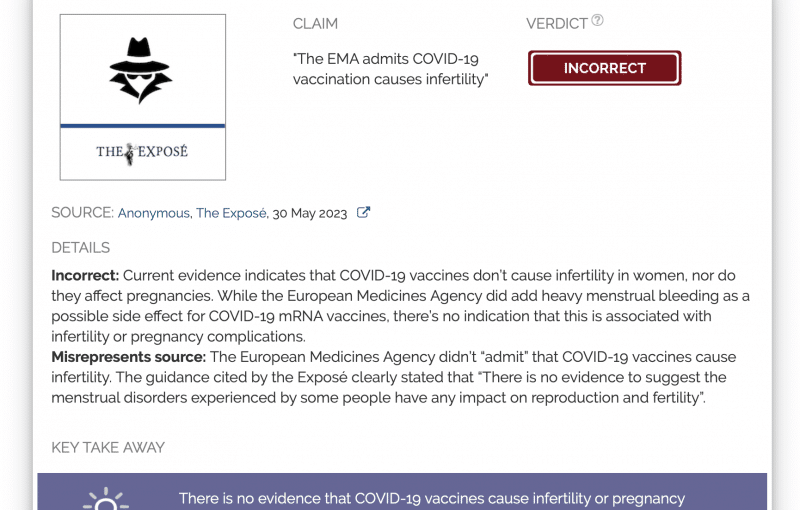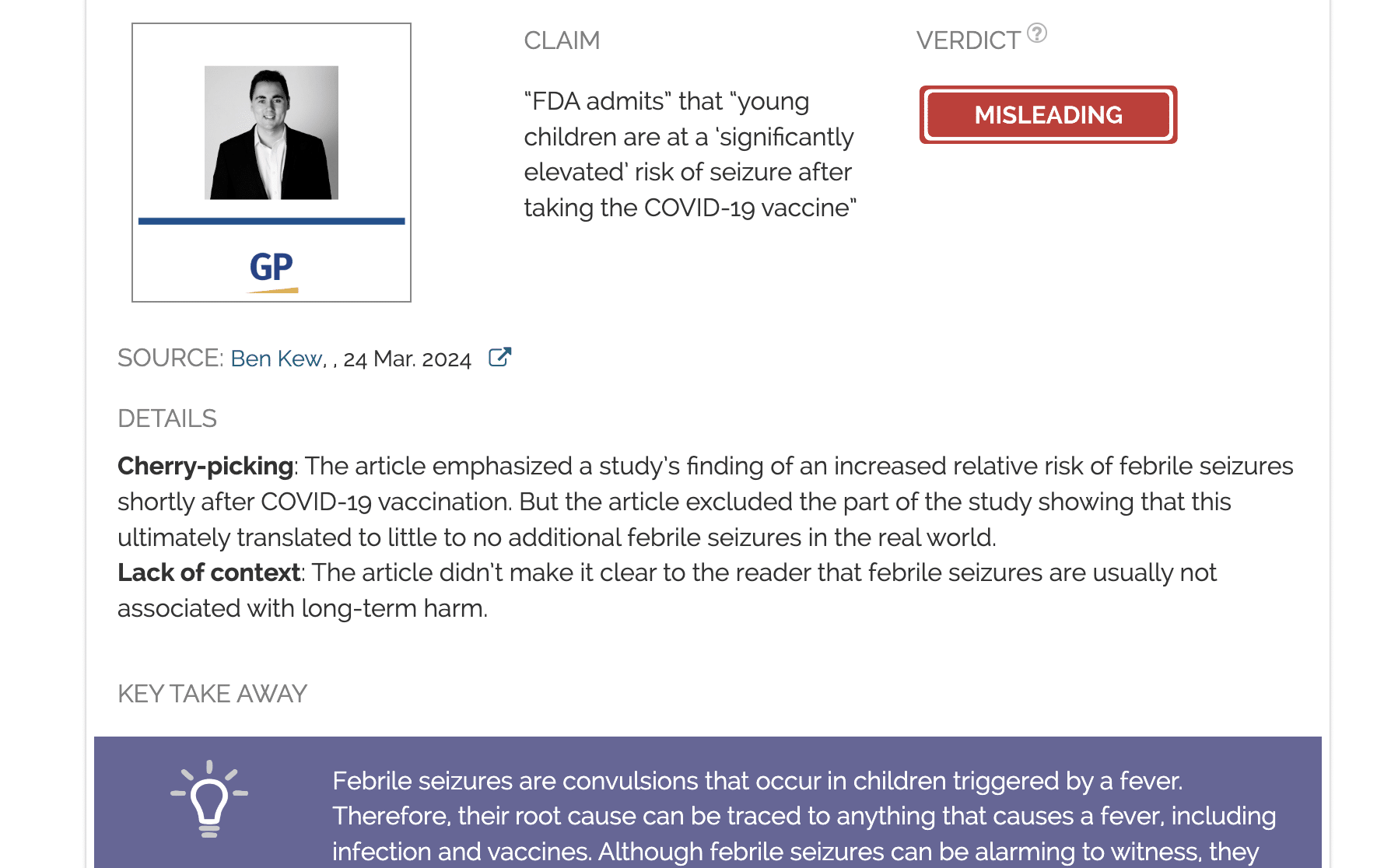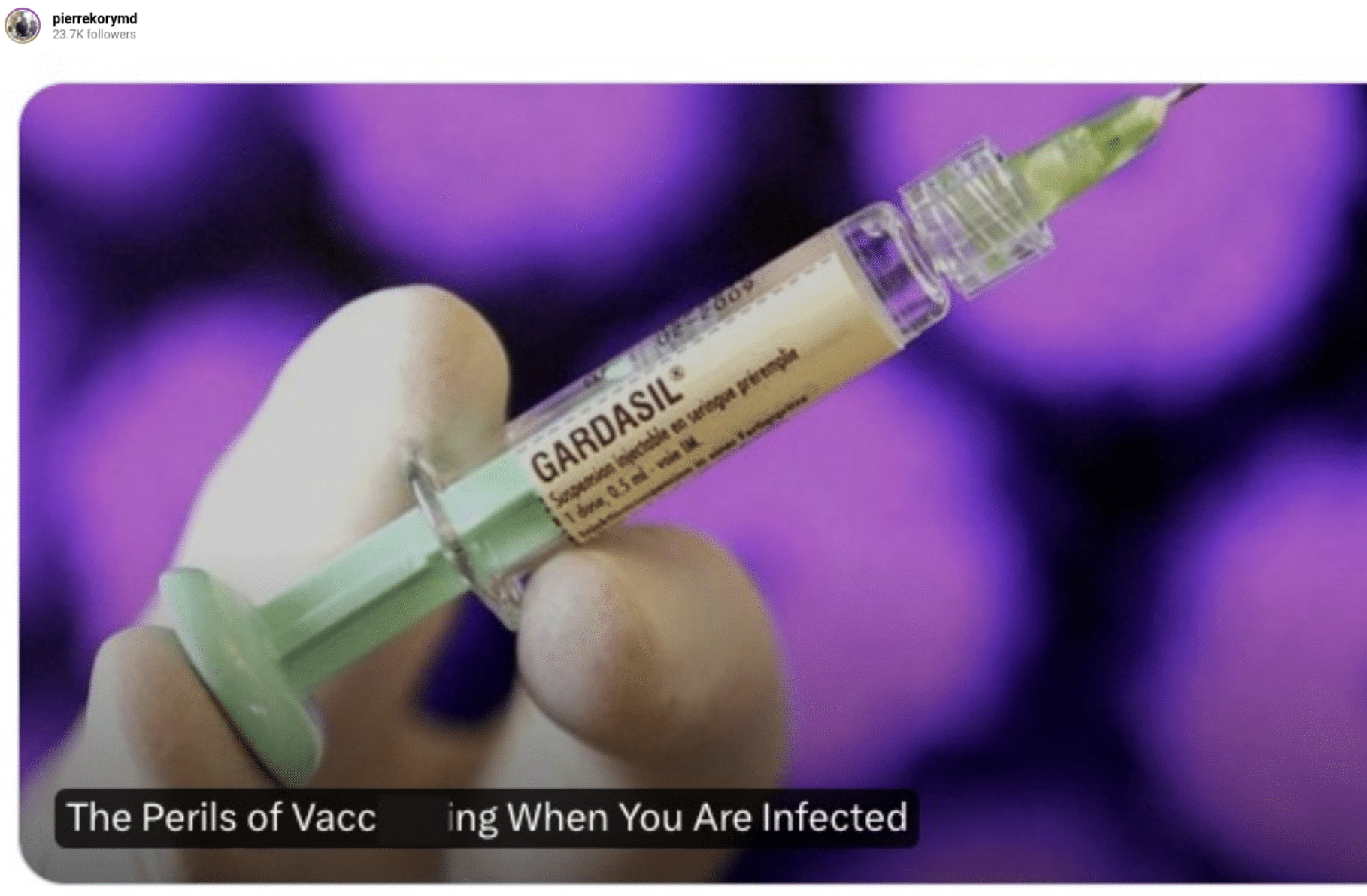- Health
There is no evidence that COVID-19 vaccinations cause infertility or pregnancy complications
Key takeaway
There is no evidence that COVID-19 vaccines cause infertility or pregnancy complications. On the other hand, pregnant women are at a higher risk of stillbirth, need for ventilation, and death if they develop COVID-19. Multiple studies have shown that getting vaccinated reduces the risk of severe disease and pregnancy complications, and that the benefits of vaccination outweigh the risks. Hence, public health authorities such as the U.S. Centers for Disease Control and Prevention recommend COVID-19 vaccination in women who are or wish to be pregnant.
Reviewed content

Verdict:
Claim:
"The EMA admits COVID-19 vaccination causes infertility"
Verdict detail
Incorrect: Current evidence indicates that COVID-19 vaccines don’t cause infertility in women, nor do they affect pregnancies. While the European Medicines Agency did add heavy menstrual bleeding as a possible side effect for COVID-19 mRNA vaccines, there’s no indication that this is associated with infertility or pregnancy complications.
Misrepresents source: The European Medicines Agency didn’t “admit” that COVID-19 vaccines cause infertility. The guidance cited by the Exposé clearly stated that “There is no evidence to suggest the menstrual disorders experienced by some people have any impact on reproduction and fertility”.
Full Claim
"The EMA admits COVID-19 vaccination causes infertility"
Review
On 30 May 2023, The Exposé published an article claiming that the European Medicines Agency (EMA) “admitted” that COVID-19 vaccines cause infertility, citing changes made by the EMA to COVID-19 vaccine guidance indicating that heavy menstrual bleeding should be listed as a side effect of the COVID-19 mRNA vaccines.
These types of allegations against COVID-19 vaccinations have been rife in the media, with many people claiming that COVID-19 vaccinations are responsible for cases of miscarriages and infertility. The U.S. Surgeon General Vivek Murthy has called COVID-19 vaccine misinformation about fertility “one of the most persistent myths during this pandemic” and which has contributed to low vaccine uptake among pregnant women, who are at a higher risk of developing severe COVID-19 and complications.
While the EMA’s Pharmacovigilance Risk Assessment Committee (PRAC) did recommend in October 2022 that the side effect of heavy menstrual bleeding be added to COVID-19 mRNA vaccine guidance, this is in no way an admission that COVID-19 vaccines cause infertility as the Exposé claimed. In fact, the PRAC added that:
“There is no evidence to suggest the menstrual disorders experienced by some people have any impact on reproduction and fertility. Available data provides reassurance about the use of mRNA COVID-19 vaccines before and during pregnancy. A review carried out by EMA’s Emergency Task Force showed that mRNA COVID-19 vaccines do not cause pregnancy complications for expectant mothers and their babies, and they are as effective at reducing the risk of hospitalization and deaths in pregnant people as they are in non-pregnant people.” [emphasis added]
However, the Exposé article omitted this part of the PRAC’s statements, instead misrepresenting it as an “admission” by the EMA, when the statements clearly indicated otherwise.
Transient changes in menstrual cycle may occur post-vaccination but don’t imply negative effects on fertility
There’s no evidence so far indicating that COVID-19 vaccines negatively affect fertility or pregnancy outcomes, nor that menstrual changes following vaccination will lead to negative effects.
The first study to explore the relationship between COVID-19 vaccines and menstruation, which included almost 4,000 women, was published in January 2022. The researchers found no association between changes in menstrual cycle length and vaccination. Overall, post-vaccination changes in menstrual cycle length was about one day[1]. This amount of change is well within naturally occurring variation in menstrual cycle length, and isn’t associated with harm. According to the International Federation of Gynecology and Obstetrics, menstrual cycles can vary naturally by up to eight days[2].
Approximately 10% of women in the study did experience a clinically significant change in their menstrual cycle length of eight days or more. However, this change was no longer seen after two post-vaccine menstrual cycles had passed, suggesting that it is transient and not harmful[1].
In an editorial for the BMJ, Viki Male, a senior lecturer in reproductive immunology at Imperial College London, discussed several possible explanations for menstrual cycle changes post-COVID vaccination. Male highlighted that menstrual cycle variations have also been associated with other vaccines such as the human papillomavirus (HPV) vaccine, as well as COVID-19 itself. What all these factors have in common is that they trigger changes in the immune system, suggesting that such changes could be behind such variations in the menstrual cycle.
She explained that such a mechanism is biologically plausible, as the hormones involved in regulating the menstrual cycle can be affected by immune system changes. The menstrual cycle is known to be affected by many different types of stressors, such as health or environmental changes. The immune response induced by vaccination could be perceived by the body as a stressor, leading to a late period. One example raised by Male was the immune cells in the uterus, which are involved in the build-up and breakdown of uterine tissue and could be affected by vaccine-induced immunological stimulation.
In summary, while COVID-19 vaccination could provoke slight changes in menstruation, these changes are short-lived, generally benign, and don’t imply that fertility has been adversely affected.
Multiple studies show that COVID-19 vaccination doesn’t adversely affect pregnancy outcomes
Claims that the COVID-19 vaccines increase the risk of negative pregnancy outcomes are unfounded, as several peer-reviewed studies have found that vaccination doesn’t lead to a greater risk of poor outcomes in pregnancy.
In a study that included over 40,000 pregnant women, getting the COVID-19 vaccination during pregnancy wasn’t associated with a greater risk of preterm birth or small-for-gestational-age at birth in comparison with unvaccinated pregnant women[3].
An analysis of data from Norwegian registries on first-trimester pregnancies, which included almost 20,000 women, didn’t find an increased risk for early pregnancy loss after COVID-19 vaccination[4]. With regards to the mRNA COVID-19 vaccines specifically, an analysis of the U.S. Centers for Disease Control and Prevention (CDC) v-safe database found that the risk of spontaneous abortion was within the baseline expected risk of spontaneous abortion, which occurs in 11 to 22% of pregnancies[5].
These observations are further supported by a meta-analysis of 21 studies, which concluded that miscarriage rates in vaccinated women were consistent with normal, pre-pandemic rates of miscarriage[6].
A systematic review of 29 studies conducted worldwide found no evidence that COVID-19 vaccines were associated with fertility or pregnancy impairment in either sex. In these studies, no significant changes of any fertility indicator evaluated were found. Indicators studied included the number of oocytes (egg cells), implantation rate, and pregnancy rate in women. In men, no negative effects were seen on molecular features of semen samples, with no changes in sperm volume, motility, or morphology[7].
So, overall, there is no evidence that COVID-19 vaccines negatively affect fertility or pregnancy. On the other hand, COVID-19 itself is associated with more than a two-fold increased risk for pregnant women to be in intensive care, to need mechanical ventilation, stillbirth, and even carry a 70% increased risk of death compared to non-pregnant women with COVID-19[8]. The risk of stillbirth was found to be especially increased with the Delta variant of the virus[9]. Therefore, the CDC and the American College of Obstetricians and Gynecologists recommend COVID-19 vaccination for women who are or wish to be pregnant.
Pfizer document regarding adverse effects from exposure to “study intervention” has to do with COVID-19 vaccine, not a vaccinated person
The article also wrongly claimed that a Pfizer document stated, in a section discussing adverse effects of the vaccine, that “shedding of the COVID-19 vaccine is possible by skin-to-skin contact and/or breathing the same air as a vaccinated person, and can, unfortunately, lead to menstrual cycle disruption among women and miscarriage among pregnant women”.
Documents from Pfizer have commonly been cited to promote inaccurate and misleading claims about the COVID-19 vaccines, and this one is no exception. The Exposé’s claim is based on a misinterpretation of the document. In fact, the document discusses being exposed to the study intervention itself, meaning the vaccine, not a vaccinated individual.
None of the COVID-19 vaccines currently authorized or approved for use in the U.S. contain live virus. Therefore, it’s biologically implausible for vaccinated people to shed the vaccine or the spike protein, as explained by the Children’s Hospital of Philadelphia. Other fact-checking groups, such as the Associated Press and USA Today previously covered this claim.
Conclusion
Misinformation such as that of this Exposé article claiming that COVID-19 vaccines cause fertility and pregnancy problems has contributed to vaccine hesitancy in many women. However, there are no studies providing evidence to support such claims. Published studies so far suggest the opposite, finding the COVID-19 vaccines to be safe regarding both fertility and pregnancy. It is COVID-19 itself that is more dangerous for pregnant women, not the vaccines. As vaccination helps to reduce the risk of COVID-related complications during pregnancy, public health authorities recommend that pregnant women and women hoping to conceive get vaccinated against COVID-19.
REFERENCES
- 1 – Edelman et al. (2022) Association Between Menstrual Cycle Length and Coronavirus Disease 2019 (COVID-19) Vaccination: A U.S. Cohort. Obstetrics and Gynecology.
- 2 – Munro et al. (2018) The two FIGO systems for normal and abnormal uterine bleeding symptoms and classification of causes of abnormal uterine bleeding in the reproductive years: 2018 revisions. International Journal of Gynecology and Obstetrics.
- 3 – Lipkind et al. (2022) Receipt of COVID-19 Vaccine During Pregnancy and Preterm or Small-for-Gestational-Age at Birth — Eight Integrated Health Care Organizations, United States, December 15, 2020–July 22, 2021. Morbidity and Mortality Weekly Report.
- 4 – Magnus et al. (2021) Covid-19 Vaccination during Pregnancy and First-Trimester Miscarriage. New England Journal of Medicine.
- 5 – Zauche et al. (2021) Receipt of mRNA Covid-19 Vaccines and Risk of Spontaneous Abortion. New England Journal of Medicine.
- 6 – Rimmer et al. (2023) The risk of miscarriage following COVID-19 vaccination: a systematic review and meta-analysis. Human Reproduction.
- 7 – Zaçe et al. (2022) The impact of COVID-19 vaccines on fertility-A systematic review and meta-analysis. Vaccine.
- 8 – Zambrano et al. (2020) Update: Characteristics of Symptomatic Women of Reproductive Age with Laboratory-Confirmed SARS-CoV-2 Infection by Pregnancy Status — United States, January 22–October 3, 2020. Morbidity and Mortality Weekly Report.
- 9 – DeSisto et al. (2021) Risk for Stillbirth Among Women With and Without COVID-19 at Delivery Hospitalization — United States, March 2020–September 2021. Morbidity and Mortality Weekly Report.



